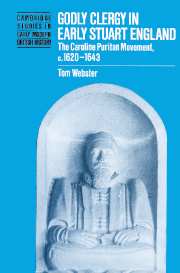Book contents
- Frontmatter
- Contents
- Acknowledgments
- List of abbreviations
- Introduction
- Part I Society, clerical conference and the Church of England
- Part II The godly ministry: piety and practice
- Part III ‘These uncomfortable times’: conformity and the godly ministers 1628–1638
- 7 Thomas Hooker and the conformity debate
- 8 Trajectories of response to Laudianism
- 9 The ecclesiastical courts and the Essex visitation of 1631
- 10 Juxon, Wren and the implementation of Laudianism
- 11 The diocese of Peterborough: a see of conflict
- 12 The metropolitical visitation of Essex and the strategies of evasion
- Part IV ‘These Dangerous Times’: the Puritan Diaspora 1631–1643
- Index
- Cambridge Studies in Early Modern History
7 - Thomas Hooker and the conformity debate
Published online by Cambridge University Press: 04 November 2009
- Frontmatter
- Contents
- Acknowledgments
- List of abbreviations
- Introduction
- Part I Society, clerical conference and the Church of England
- Part II The godly ministry: piety and practice
- Part III ‘These uncomfortable times’: conformity and the godly ministers 1628–1638
- 7 Thomas Hooker and the conformity debate
- 8 Trajectories of response to Laudianism
- 9 The ecclesiastical courts and the Essex visitation of 1631
- 10 Juxon, Wren and the implementation of Laudianism
- 11 The diocese of Peterborough: a see of conflict
- 12 The metropolitical visitation of Essex and the strategies of evasion
- Part IV ‘These Dangerous Times’: the Puritan Diaspora 1631–1643
- Index
- Cambridge Studies in Early Modern History
Summary
For two of the leading lights of the godly ministry, the years between 1628 and 1633 had been extremely unsettled. The conference which Thomas Hooker had organised had operated with relative impunity during the episcopate of George Montaigne. Late in his reign Montaigne had brought Hooker before his court at Little Baddow and required him to obtain a licence as a schoolmaster. Hooker was questioned for absenting himself from communion in his home parish, Little Baddow, but he claimed to take the sacrament in the neighbouring parish of Chelmsford. Although this was strictly illegal, he doesn't seem to have been troubled any further. Montaigne became to hear him preach at Chelmsford, commended him, ‘and desired him, for his sake not to meddle with the discipline of the Church – the field was large enough besides. And he did promise him to do so.’
The peaceable days under Montaigne were coming to a close, however. According to Peter Heylin, the King regarded Montaigne as ‘a man inactive … one that loved his ease too well to disturb himself in the concernments of the church’. Charles resolved to reform the clergy of the diocese ‘by placing over them a Bishop of such Parts and Power as they should be unable either to withstand or afraid to offend’. Montaigne was appointed to the see of Durham, in effect a demotion, and he was replaced by William Laud.
- Type
- Chapter
- Information
- Godly Clergy in Early Stuart EnglandThe Caroline Puritan Movement, c.1620–1643, pp. 151 - 166Publisher: Cambridge University PressPrint publication year: 1997



